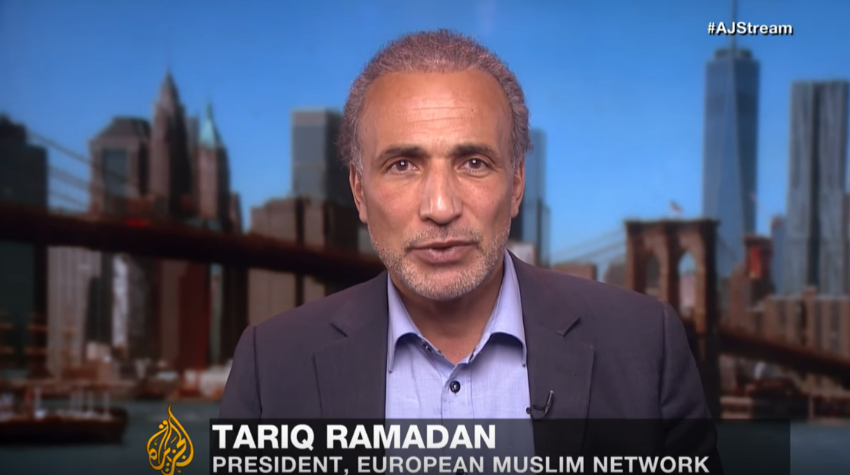Published August 29, 2004It’s not every day that the U.S. Department of Homeland Security revokes a visa issued to a Swiss scholar scheduled to teach at one of America’s premier universities. But this has just happened and it’s a good thing too.
The Swiss scholar is Tariq Ramadan. He is Islamist royalty–his maternal grandfather, Hassan al-Banna, founded the Muslim Brotherhood, probably the single most powerful Islamist institution of the 20th Century, in Egypt in 1928. Ramadan is a Swiss citizen because his father, Said Ramadan, also a leading Islamist, fled from Egypt in 1954 after a crackdown on the brotherhood. Said Ramadan reached Geneva in 1958, where Tariq was born in 1962.
Thanks to his pedigree and his talents, Tariq Ramadan has emerged as a significant force in his own right. Symbolic of this, Time magazine in April named him among the world’s top 100 scientists and thinkers. And so, when the University of Notre Dame went looking for a Henry R. Luce professor of religion, conflict and peace-building, it unsurprisingly settled on Ramadan.
Its offer was made and accepted at the beginning of 2004; a work visa followed in February. Ramadan bought a house, found schools for his four children, and dispatched his personal effects to South Bend, Ind. He was supposed to have started teaching last week.
But on July 28, just nine days before the Ramadans were to leave for the United States, Ramadan was informed that Homeland Security had revoked his work visa.
A Homeland Security spokesman, Russ Knocke, later explained this had been done in accord with a law that denies entry to non-citizens who have used a “position of prominence within any country to endorse or espouse terrorist activity.” The revocation, Knocke added, was based on “public safety or national security interests.”
Of course, Ramadan dismisses the revocation as “unjustified” and caused by “political pressure.” (He even blames me for the decision.)
What’s up?
The Department of Homeland Security knows much more than I do, but it is not talking. A review of the news, however, gives an idea of what the problem is. Here are some reasons why Ramadan might have been kept out:
He has praised the brutal Islamist policies of Sudanese politician Hassan Al-Turabi. Turabi called Ramadan the “future of Islam.”
Ramadan was banned from entering France in 1996 on suspicion of having links with an Algerian Islamist who had recently initiated a terrorist campaign in Paris.
Ahmed Brahim, an Algerian engineer indicted for Al Qaeda activities, had “routine contacts” with Ramadan, according to a Spanish judge in 1999.
Djamel Beghal, leader of a group accused of planning to attack the U.S. embassy in Paris, stated in his 2001 trial that he had studied with Ramadan.
Along with many Islamists, Ramadan has denied that there is “any certain proof” that Osama bin Laden was behind Sept. 11, 2001.
He publicly refers to the Islamist atrocities of Sept. 11, Bali and Madrid as “interventions,” minimizing them to the point of near-endorsement.
And here are other reasons, dug up by Jean-Charles Brisard, a former French intelligence officer doing work for some of the Sept. 11 families, as reported in the newspaper, Le Parisien:
Intelligence agencies suspect that Ramadan (along with his brother Hani) coordinated a meeting at the Hotel Penta in Geneva for Ayman al-Zawahiri (deputy head of Al Qaeda) and Omar Abdel Rahman (the blind sheik, now in a Minnesota prison).
Ramadan’s address appears in a register of Al Taqwa Bank, an organization the State Department accuses of supporting Islamist terrorism.
Then there is the intriguing possibility, reported by Olivier Guitta, that Osama bin Laden studied with Tariq Ramadan’s father in Geneva, suggesting that the future terrorist and the future scholar might have known each other.
Ramadan denies all ties to terrorism, but the pattern is clear.
As Lee Smith writes in the American Prospect, Ramadan is a cold-blooded Islamist whose “cry of death to the West is a quieter and gentler jihad, but it’s still jihad.”
These reasons explain why Americans should thank the Department of Homeland Security for keeping Tariq Ramadan out of the United States. But the story is not over: The State Department has in effect encouraged Ramadan to reapply for a different type of visa, making the recent developments probably just Round 1 of a drawn-out match.
This controversy also raises a broader issue: What if Ramadan were found without ties to terrorism. Should he then be a shoo-in for a visa to the United States?
In my view, no. The enemy in the current war is not “terrorism” but a totalitarian ideology known variously as militant Islam or Islamism. The last thing the United States needs is more supporters of this ideology within its borders. Therefore, U.S. immigration officials should use a criterion more broad than links to terrorism and make sure to rigorously exclude them.
Daniel Pipes, formerly an instructor at the University of Chicago, is director of the Philadelphia-based Middle East Forum, a pro-Israel advocacy group. He is the author of “Miniatures.”
Copyright © 2004, Chicago Tribune



![PALEXPO : Democratic Engagement & Justice for Palestinians [08/07/2017]](https://tariqramadan.com/english/wp-content/uploads/sites/9/2017/07/Palexpo.png)
![Bristol Festival of Ideas : Conversation with Julian Baggini [24/05/2017]](https://tariqramadan.com/english/wp-content/uploads/sites/9/2017/06/bristol.png)
![Interview on BBC Radio Ulster [06/06/2017]](https://tariqramadan.com/english/wp-content/uploads/sites/9/2017/06/p03nnqlv.jpg)
![Interview on BBC 4 : What do the London attacks have to do with Islam? What is the Muslims’ responsibility?[06/06/2017]](https://tariqramadan.com/english/wp-content/uploads/sites/9/2017/06/bbc.jpg)


Salaam
Thanks for lightening the tone by posting Pipes’ little piece in- he provides great comic relief even if he is a nasty piece of scum.
Zinnia